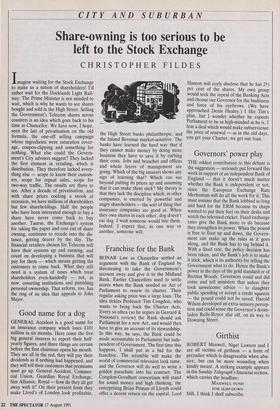Governors' power play
THE oddest contribution to this debate is the suggestion — seriously put forward this week in support of an independent Bank of England — that it doesn't much matter whether the Bank is independent or not, since the European Exchange Rate Mechanism will do all the work for it. This must assume that the Bank lobbied so long and hard for the ERM because its chaps wanted to put their feet on their desks and watch the televised cricket. Fixed exchange rates give the Bank more to do because they strengthen its power. When the pound is free to float up and down, the Govern- ment can make up the rules as it goes along, and the Bank has to tag behind it. With a fixed rate, the policy decision has been taken, and the Bank's job is to make it stick, which is its authority for telling the Government what to do. Hence the Bank's power in the days of the gold standard or of Bretton Woods. Governors could and did come and tell ministers that unless they took unwelcome advice — to slaughter public spending or accept a credit squeeze — the pound could not be saved. Harold Wilson developed an extra-sensory percep- tion and could sense the Governor's doom- laden Rolls-Royce afar off, on its way to Downing Street.


















































 Previous page
Previous page